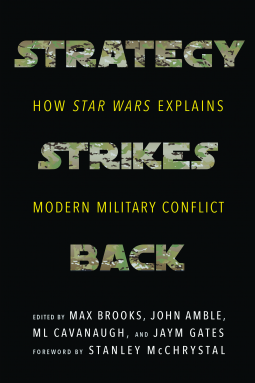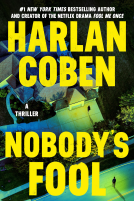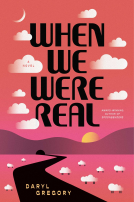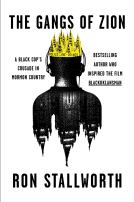
Strategy Strikes Back
How Star Wars Explains Modern Military Conflict
by
This title was previously available on NetGalley and is now archived.
Send NetGalley books directly to your Kindle or Kindle app
1
To read on a Kindle or Kindle app, please add kindle@netgalley.com as an approved email address to receive files in your Amazon account. Click here for step-by-step instructions.
2
Also find your Kindle email address within your Amazon account, and enter it here.
Pub Date May 01 2018 | Archive Date May 14 2018
University of Nebraska Press | Potomac Books
Talking about this book? Use #StrategyStrikesBack #NetGalley. More hashtag tips!
Description
Each chapter of Strategy Strikes Back provides a relatable, outside‑the‑box way to simplify and clarify the complexities of modern military conflict. A chapter on the case for planet building on the forest moon of Endor by World War Z author Max Brooks offers a unique way to understand our own sustained engagement in war-ravaged societies such as Afghanistan. Another chapter on the counterinsurgency waged by Darth Vader against the Rebellion sheds light on the logic behind past military incursions in Iraq. Whether using the destruction of Alderaan as a means to explore the political implications of targeting civilians, examining the pivotal decisions made by Yoda and the Jedi Council to differentiate strategic leadership in theory and in practice, or considering the ruthlessness of Imperial leaders to explain the toxicity of top-down leadership in times of war and battle, Strategy Strikes Back gives fans of Star Wars and aspiring military minds alike an inspiring and entertaining means of understanding many facets of modern warfare. It is a book as captivating and enthralling as Star Wars itself.
Advance Praise
“Over the course of history, our single greatest vulnerability has been a failure of imagination. Strategy Strikes Back confronts that vulnerability. The future may not evolve precisely as these authors suggest, but evolve it will. As it does, we will discover that some of tomorrow’s challenges will prove to be timeless, and others surprisingly new. Learning to imagine now will be time well spent.”—Gen. Martin Dempsey, former chairman of the Joint Chiefs of Staff
“Star Wars is just as much a foundational mythology of our time as The Iliad was a long time ago. Strategy Strikes Back ingeniously uses that world far, far away to help readers take a look at our wars here today.”—P. W. Singer, bestselling author of Wired for War and coauthor of Ghost Fleet: A Novel of the Next World War
Available Editions
| EDITION | Other Format |
| ISBN | 9781640120334 |
| PRICE | $29.95 (USD) |
| PAGES | 272 |
Links
Featured Reviews
 Alexis A, Reviewer
Alexis A, Reviewer
If I were teaching a course on military strategy, this would be one of my textbooks. The authors rightfully decide that abstract and difficult theories of the business and ethics of war are hard to understand, and everyone comes to the subject with their own biases of country, history and experience. Applying theory to a fictional universe with established right and wrong sides that most people around the world have some exposure to helps immensely. If you want to talk about the theory of rebuilding places after a war to prevent further conflict, rebuilding Endor is a politically neutral subject. Even the casual Star Wars fan can read this just as an exploration of the universe that is more interesting than the Phantom Menace and still learn from it. The subjects are well argued and easy to follow.
 Diane H, Reviewer
Diane H, Reviewer
Military strategies compared to Star Wars are the theme of the 28 essays within Strategy Strikes Back. Focusing on both past warfare and the wars to come, it is comprehensively researched and annotated.
I have to say that only reviewers will have the patience to read a foreword, a preface and an introduction all in one book. You can probably skip all three though I’m going to quote the Introduction later. The remaining book is split into four sections: Society and War, Preparation for War, Waging a War, and Assessment of War. There is also an epilogue.
I selected this book solely because of one of its authors, Max Brooks. I adored his World War Z book (not so much the movie though the visuals were awesome—who can forget the zombies climbing the city’s walls). Unfortunately, he only pens the introduction and first essay. However, he included some profound thoughts on why an average person should care about military strategy. As he states “to be blunt, war impacts everyone [...] from the language we speak to the land we live in to the god we choose or don’t choose to worship.” Using Star Wars as an easily understood analogy was another co-writer’s idea he actually used when tasked with training South Koreans in military strategy.
The essays vary widely in style. Some read like dissertations, others like pop culture fandom. Most are written in third person. One is written in first person by the “esteemed historian of the Galactic Civil War”, who I assume is fictional.
There are a few errors within. Saying that Leia caused woman to be taken more seriously in leadership roles may be arguably true. Saying that she influenced Wonder Woman is absurd when she predates Leia by more than three decades in comics. In contrast, some things that sound unbelievable are actually true like the chapter note referencing Wookieepedia, which is the actual name of the Star Wars wiki.
Overall, I enjoyed reading Strategy Strikes Again. But it isn’t for everyone, readers should be familiar with Star Wars but not too familiar or the duplicate descriptions of battle scenes will become tiresome. I enjoyed the essays that included less Star Wars and more current or future war strategies and weapons. How is the clone army’s swarm mindset being replicated with US military drones? How did the Soviets and US militaries spend millions exploring Jedi mind tricks like Anakin’s floating fruit over a banquet table? Yes, more please. Some other essays droned on and on like the classic military strategy texts described by Max Brooks in the Introduction as “total snoozefests”. So difficult to rate, this book is. (You knew I had to do it somewhere in this review). For Star War nerds (you know who you are) or war fanciers, 5 stars. For all others, 3 stars. So 4 stars overall.
Thanks to the publisher, University of Nebraska/Potomac Books, and NetGalley for an advance copy.
 Malorie N, Book Trade Professional
Malorie N, Book Trade Professional
The best essays in this book make you reflect on Star Wars in new ways, with the writers showing sharp insights into this fictional universe and its implications. To give one example, Jim Golby's essay makes a brief but quite observant point about Luke Skywalker's actions in Return of the Jedi that I had never considered or heard discussed much, in years of Star Wars fandom. There are only some minor hiccups here and there where I thought an author maybe had gotten something slightly wrong about the universe, but I was generally impressed with the level of SW analysis (The Clone Wars animated series is discussed surprisingly often!).
Similar insights are here to be had on military and strategic matters, with the book succeeding in engaging a layman like me in themes such as toxic and over-centralized leadership, the importance of rapid-deploying expeditionary forces, fleet and naval command structure, among others. I would say that, because the book embraces a goal of accessibility for a layperson like myself, the insights on military affairs are shallower than what you will take away in just new ways to think about Star Wars. What I mean is that the Star Wars fan will come away with more learned than the military thinker.
While I had a good time with the collection, some themes are discussed more than once (the civil-military divide mainly). There are also some pieces where I felt the author was sort of spinning their wheels. In particular there are a couple pieces written from an in-universe perspective (with a fictional narrator), and some of them just seemed like cut-and-dry summaries of the Galactic Civil War. A small handful of other inclusions did feel somewhat perfunctory as well, so there is a bit of unevenness to the book. Admittedly, this is a difficult sensation to avoid in an anthology.
Readers who liked this book also liked:
Dominic Pettman
Health, Mind & Body, Nonfiction (Adult), Politics & Current Affairs
Jodi Picoult; Jennifer Finney Boylan
General Fiction (Adult), Literary Fiction, Women's Fiction
Joe Hill, Stephen Graham Jones, Grady Hendrix, Catriona Ward, and Owen King
Essays & Collections, General Fiction (Adult), Mystery & Thrillers














